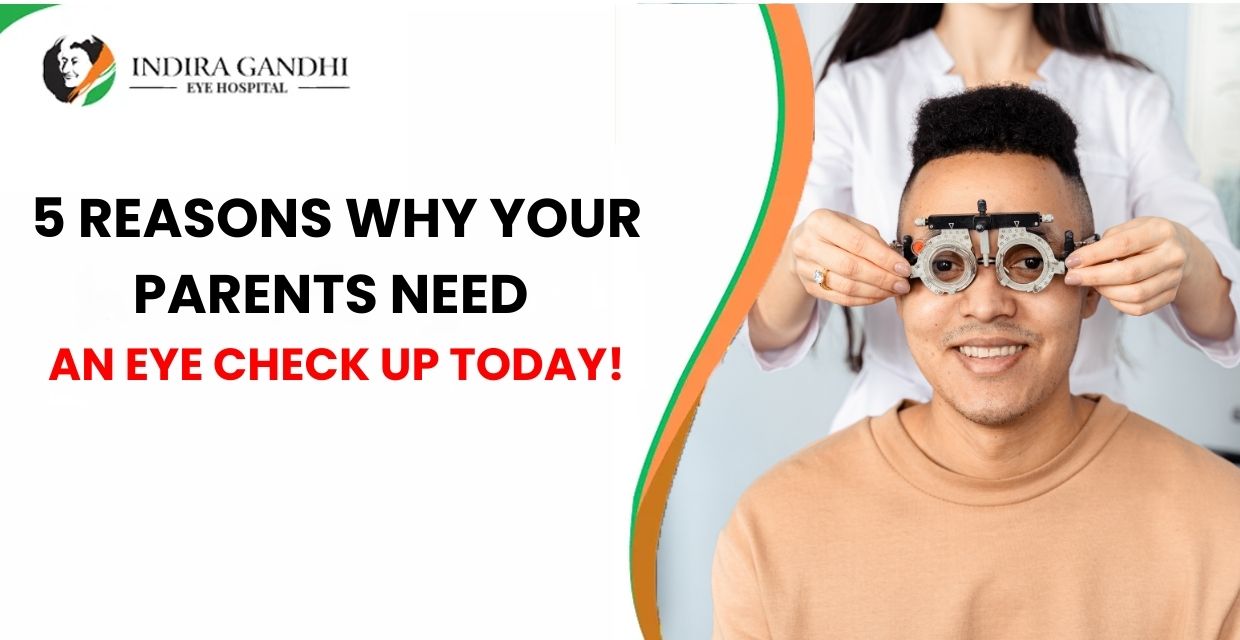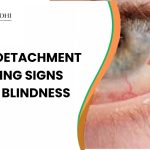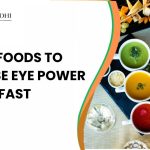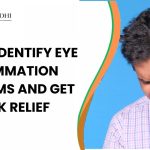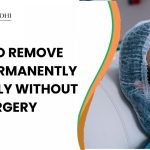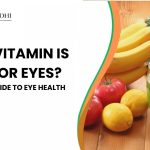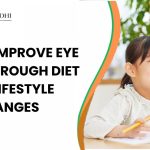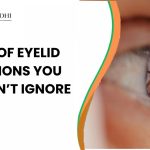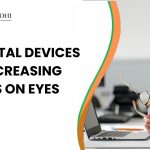|
Getting your Trinity Audio player ready...
|
We all cherish our parents. They’ve watched over us, guided us, and been the foundation of our lives. As they age, our roles often subtly shift, and we find ourselves wanting to care for them as they once cared for us. While we often think about their general health, diet, and mobility, there’s one incredibly vital aspect that sometimes gets overlooked: their vision. Their eyes are their windows to the world, critical for maintaining independence, enjoying hobbies, and simply navigating daily life safely.
It’s easy for small vision changes to go unnoticed or be dismissed as “just getting old.” However, many serious age-related eye conditions progress silently, without pain or obvious symptoms, until significant damage has occurred. This is why urging your parents to get a comprehensive eye check-up is not just a suggestion – it’s an act of profound love and foresight. Today, we’re going to explore 5 reasons why your parents need an eye check up today!, understanding why this simple proactive step can make all the difference in preserving their sight and quality of life. At Indira Gandhi Eye Hospitals, we believe in empowering families with the knowledge to protect their loved ones’ vision effectively and compassionately.
The Unseen Changes: Why Aging Eyes Need Special Attention
Just like every other part of the body, our eyes undergo natural changes as we age. The lens becomes less flexible, making it harder to focus up close (presbyopia). The vitreous gel inside the eye can shrink, leading to floaters. These are normal, but they also signal a time when more significant, vision-threatening conditions become increasingly common.
The challenge lies in the insidious nature of many age-related eye diseases. They often develop slowly, without pain, and can affect peripheral vision first, which means your parents might not notice any symptoms until the disease is in its advanced stages. They might compensate unconsciously, adapting to subtle changes without realizing the severity of the underlying issue. This is why a proactive approach, rather than waiting for symptoms, is crucial. A regular, comprehensive dilated eye exam can detect these silent threats early, giving your parents the best possible chance to maintain their precious vision.
Let’s delve into 5 reasons why your parents need an eye check-up today! that are often linked to aging eyes, and why early detection is paramount for each.
Have your parents had their eye check-up yet?
Regular eye check-ups can detect problems early and make treatment easier. Book an appointment today and protect their vision.
Book Eye Check-UpReason 1: The Silent Thief – Glaucoma
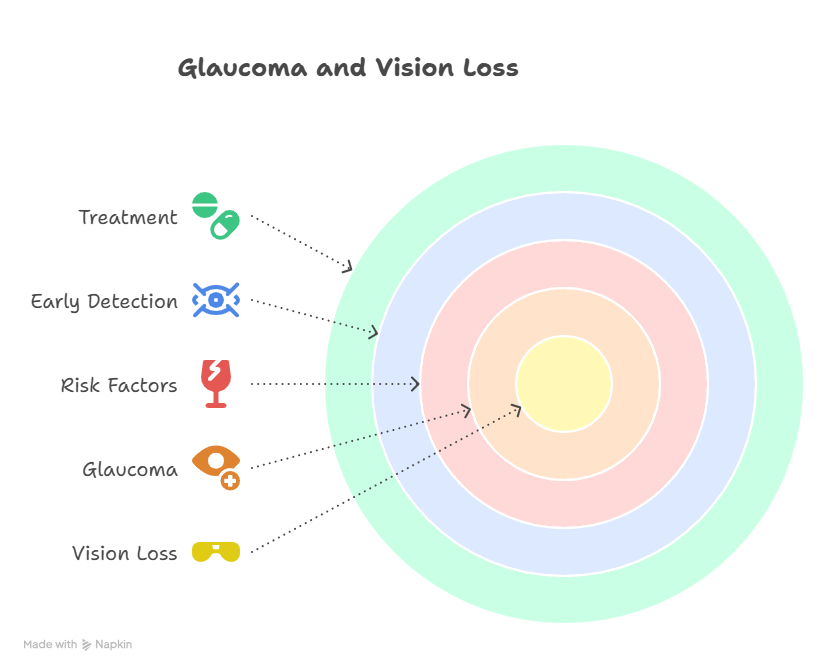
Imagine a thief who slowly and quietly steals something invaluable without you even realizing it until it’s too late. That’s essentially what glaucoma can do to your parents’ sight. It’s a group of eye diseases that damage the optic nerve, the vital cable that transmits visual information from the eye to the brain. In most common forms, this damage is associated with abnormally high pressure inside the eye (intraocular pressure, or IOP).
- Why it’s the “Silent Thief”: The insidious nature of open-angle glaucoma (the most common type) is its hallmark. It typically affects peripheral vision first, gradually, over many years. Your parents might lose a significant portion of their side vision before they notice any changes. Central vision, which we use for reading and recognizing faces, is usually spared until very late in the disease process. By the time symptoms are noticeable, irreversible vision loss may have already occurred. This is why it’s a critical reason on our list of 5 reasons why your parents need an eye check-up today!.
- Risk Factors: The risk of glaucoma significantly increases with age, especially over 60. Other risk factors include a family history of glaucoma, certain ethnic backgrounds (e.g., African, Hispanic, Asian), diabetes, high blood pressure, prolonged steroid use, and severe nearsightedness.
- The Crucial Role of Early Detection: Since there are no early symptoms, a comprehensive eye exam is the only way to detect glaucoma. During an exam, the ophthalmologist will measure eye pressure (tonometry), examine the optic nerve for signs of damage, and often perform a visual field test to check for peripheral vision loss.
- Treatment: While vision lost to glaucoma cannot be restored, early detection allows for treatment that can effectively prevent further vision loss. Treatment options primarily focus on lowering eye pressure and preserving the remaining vision. These include prescription eye drops, laser procedures (like Selective Laser Trabeculoplasty, SLT, or Laser Iridotomy for acute angle-closure), and surgical procedures (like trabeculectomy or drainage implants) for more advanced or unresponsive cases. The sooner glaucoma is diagnosed, the better the chances of maintaining good sight.
Reason 2: Preserving the Core – Age-Related Macular Degeneration (AMD)
If glaucoma is the silent thief of peripheral vision, Age-related Macular Degeneration (AMD) is a major threat to central vision, which is indispensable for daily activities like reading, driving, and recognizing faces. AMD affects the macula, the small, central part of the retina responsible for sharp, detailed sight.
- Understanding AMD:
- Dry AMD: This is the more common form, accounting for about 85-90% of cases. It occurs when light-sensitive cells in the macula slowly break down, often due to the accumulation of yellowish deposits called drusen. Vision loss is typically gradual.
- Wet AMD: This is less common but much more serious. Abnormal, fragile blood vessels grow under the retina and macula. These vessels often leak fluid or blood, leading to rapid, severe vision loss.
- Dry AMD: This is the more common form, accounting for about 85-90% of cases. It occurs when light-sensitive cells in the macula slowly break down, often due to the accumulation of yellowish deposits called drusen. Vision loss is typically gradual.
- Why Early Detection Matters: The primary risk factor for AMD is age, typically affecting individuals over 50. Genetics and lifestyle factors like smoking are also significant. For dry AMD, there’s no specific medical treatment to reverse it, but specific vitamin supplements (AREDS2 formula) and lifestyle changes can help slow progression. However, for wet AMD, early detection is critical. Modern treatments, primarily anti-VEGF injections (medications injected directly into the eye), can stabilize or even significantly improve vision if administered promptly. Delay in treatment for wet AMD can result in irreversible and profound central vision loss. This urgency is a key component of 5 reasons why your parents need an eye check-up today!.
- Symptoms: In the early stages, AMD often has no noticeable symptoms. As it progresses, your parents might experience blurred central vision, difficulty reading or seeing fine details, distorted vision (straight lines appearing wavy), a dark or blank spot in their central vision, or difficulty adapting to low light.
Reason 3: Clearing the Window – Cataracts
Cataracts are perhaps the most well-known age-related eye condition, and fortunately, one of the most treatable. A cataract is simply a clouding of the eye’s natural lens, which sits behind the iris and pupil. Normally, the lens is clear and works like a camera lens, focusing light onto the retina. As we age, proteins in the lens can clump together, causing it to become cloudy.
- Why it’s Common with Age: Cataracts are a natural part of the aging process. Most people will develop some degree of cataracts by their 70s or 80s.
- Symptoms: As cataracts progress, your parents might experience:
- Blurred, cloudy, or hazy vision.
- Increased sensitivity to glare from lights (especially headlights at night).
- Fading or yellowing of colors.
- Difficulty seeing clearly in dim light.
- Frequent changes in eyeglass prescriptions that don’t seem to help much.
- Double vision in one eye.
- Why “Today!”: While cataracts don’t typically cause severe pain or immediate blindness, they can significantly impair quality of life, making daily activities like reading, driving, and distinguishing colors difficult and risky. They can also increase the risk of falls for seniors. The great news is that cataract surgery is one of the safest and most successful surgical procedures performed worldwide. It involves removing the cloudy natural lens and replacing it with a clear artificial intraocular lens (IOL), restoring clear vision. Early detection allows your parents and their eye doctor to plan for surgery at an optimal time, before vision loss becomes debilitating. This incredible success rate makes it a compelling reason among the 5 reasons why your parents need an eye check-up today!.
Have your parents had their eye check-up yet?
Regular eye check-ups can detect problems early and make treatment easier. Book an appointment today and protect their vision.
Book Eye Check-UpReason 4: The Diabetic Connection – Diabetic Retinopathy
Even if your parents don’t have a confirmed diagnosis of diabetes, it’s vital to consider diabetic retinopathy. Many older adults have undiagnosed Type 2 diabetes or pre-diabetes, and their eyes can be affected before they even know they have the condition. Diabetic retinopathy is a serious complication of diabetes that damages the blood vessels in the retina.
- Understanding the Damage: Persistently high blood sugar levels weaken and damage the tiny blood vessels in the retina. They can swell and leak fluid or blood (non-proliferative diabetic retinopathy), or in advanced stages, abnormal new blood vessels can grow on the retina (proliferative diabetic retinopathy). These new vessels are fragile and can bleed into the eye or cause scar tissue that pulls on the retina, leading to retinal detachment.
- Why it’s Silent Initially: Crucially, diabetic retinopathy often has no symptoms in its early stages. Vision loss only occurs when the damage is more advanced, such as when fluid leaks into the macula (diabetic macular edema) or when abnormal vessels bleed significantly.
- Risk Factors: The longer your parents have had diabetes and the poorer their blood sugar control, the higher their risk. High blood pressure and high cholesterol also significantly increase the risk.
- The Critical Need for Dilated Eye Exams: A comprehensive dilated eye exam is the only way to detect diabetic retinopathy early, often before any vision changes occur. This is why it’s a cornerstone among the 5 reasons
why your parents need an eye check-up today!. If detected early, managing blood sugar, blood pressure, and cholesterol can often slow or prevent progression. If the disease has advanced, laser treatment or intravitreal injections (medications injected into the eye) can effectively prevent severe vision loss and stabilize the condition.
Reason 5: Preserving Overall Quality of Life & Detecting Other Issues
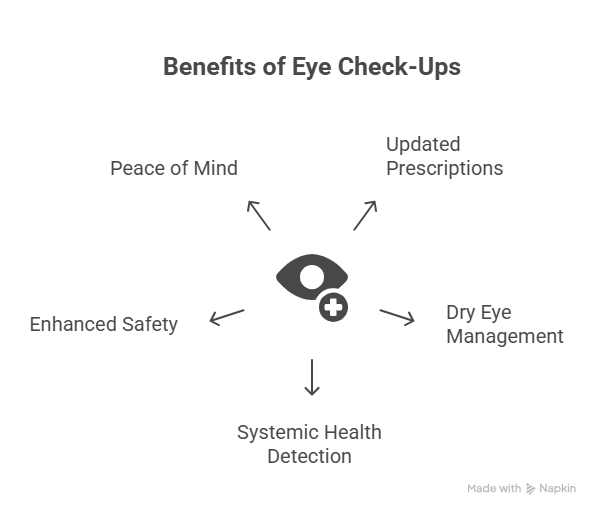
Beyond specific age-related eye diseases, a comprehensive eye check-up offers numerous benefits that directly impact your parents’ daily comfort, safety, and overall health, making it one of the most encompassing 5 reasons why your parents need an eye check-up today!.
- Updating Refractive Error Prescriptions: Even without serious disease, eyes naturally change with age. Your parents’ eyeglass or contact lens prescription might need updating. Clear, comfortable vision is essential for everything from reading a book to navigating unfamiliar surroundings. Uncorrected vision can lead to eye strain, headaches, and even an increased risk of falls.
- Diagnosing and Managing Dry Eye Syndrome: Dry eye is incredibly common in older adults due to reduced tear production, hormonal changes, and environmental factors. Symptoms like persistent burning, grittiness, redness, or watery eyes can be very uncomfortable and affect vision quality. An eye exam can diagnose the severity of dry eye and recommend appropriate treatments, from artificial tears and warm compresses to prescription medications.
- Detecting Signs of Other Systemic Health Conditions: The eye is a unique “window” to the body’s overall health. During an eye exam, an ophthalmologist can sometimes detect early signs of systemic diseases like high blood pressure, high cholesterol, autoimmune conditions (e.g., rheumatoid arthritis), or even neurological issues and certain types of tumors, simply by examining the blood vessels, optic nerve, and retina. Early detection of these non-eye conditions can lead to life-saving interventions.
- Enhancing Safety and Independence: A Clear vision is paramount for maintaining independence in daily life. It affects your parents’ ability to drive safely, read medication labels accurately, cook, enjoy hobbies, and most importantly, navigate their environment without the risk of falls. Falls are a major cause of injury and disability in older adults, and impaired vision is a significant contributing factor. Ensuring they have the best possible vision is an investment in their safety and autonomy.
- Providing Peace of Mind: Knowing that their eyes have been thoroughly checked by an expert and are healthy (or that any issues are being managed) brings immense peace of mind not only to your parents but to you as well.
Why “Today!” Matters: Overcoming Procrastination
The emphasis on “today!” in 5 reasons why your parents need an eye check-up today! is not just a call to action; it’s a reflection of urgency. Many eye conditions, particularly glaucoma and early diabetic retinopathy, are symptom-free in their initial stages. Waiting for symptoms to appear means waiting for irreversible damage to occur. Procrastination in eye care can lead to avoidable vision loss. Encouraging your parents, and perhaps even helping them schedule and attend their appointment, is one of the most meaningful ways you can support their health.
A comprehensive eye check-up involves more than just reading an eye chart. It typically includes:
- Visual Acuity Test: To measure how well they see at various distances.
- Eye Pressure Test (Tonometry): To check for glaucoma.
- Slit Lamp Examination: To magnify and examine the front of the eye (cornea, iris, lens) for cataracts, dry eye, or other issues.
- Dilated Fundus Examination: After dilating drops widen the pupils, the doctor can get a clear view of the retina, macula, and optic nerve to look for signs of AMD, diabetic retinopathy, glaucoma, and other conditions.
- Visual Field Test: If glaucoma is suspected, this test checks for blind spots in peripheral vision.
Your Vision, Our Priority: Expert Care at Indira Gandhi Eye Hospitals
The eyes are extraordinary organs, and with age, they require extra vigilance and care. Understanding the 5 reasons why your parents need an eye check-up today! underscores the critical importance of regular, comprehensive eye examinations. It’s an investment in their continued independence, safety, and overall quality of life. By taking this proactive step, you’re not just preventing potential vision loss; you’re helping them to continue enjoying the world in all its clarity.
At Indira Gandhi Eye Hospitals, our dedicated team of experienced ophthalmologists is committed to providing world-class eye care for all ages, with a special focus on the unique needs of seniors. We utilize state-of-the-art diagnostic equipment and offer a full spectrum of advanced treatments for age-related eye diseases, from early detection and medical management to advanced surgical interventions. We are here to partner with you and your parents, ensuring their eyes receive the expert and compassionate care they deserve.
Don’t wait for symptoms to appear. Take the initiative today. For comprehensive eye examinations, personalized advice, and advanced treatment options, we invite you to connect with us. Visit our website at https://indiragandhiehospital.com/ to learn more and schedule an appointment. Let Indira Gandhi Eye Hospitals be your trusted ally in preserving your parents’ precious vision.
Have your parents had their eye check-up yet?
Regular eye check-ups can detect problems early and make treatment easier. Book an appointment today and protect their vision.
Book Eye Check-UpFrequently Asked Questions (FAQs)
How often should older adults get a comprehensive eye check-up?
Generally, adults over 60 should have a comprehensive dilated eye examination at least once a year, or more frequently if they have pre-existing eye conditions, diabetes, or a strong family history of eye diseases like glaucoma or macular degeneration.
My parents say their vision is fine, so why do they need a check-up?
Many serious eye conditions, such as glaucoma and early stages of diabetic retinopathy, are often asymptomatic in their initial phases, meaning there are no noticeable symptoms. A comprehensive eye check-up is the only way to detect these “silent” diseases before significant, irreversible vision loss occurs.
What if my parents are hesitant to go for an eye check-up?
It’s common for older adults to be hesitant due to fear of bad news, cost, or inconvenience. You can help by explaining the importance of early detection, offering to schedule the appointment, providing transportation, and accompanying them to offer support and listen to the doctor’s recommendations.
Will a regular glasses prescription check suffice for their eye health?
No, a simple glasses prescription check is not enough for older adults. A comprehensive eye check-up involves dilating the pupils to thoroughly examine the retina and optic nerve for diseases like glaucoma, cataracts, and macular degeneration, which a standard refraction won’t identify.
Can an eye exam detect other health problems besides eye conditions?
Yes, an eye exam can often reveal signs of systemic health conditions such as high blood pressure, diabetes, high cholesterol, and in rare cases, even certain neurological disorders or tumors, making it a valuable part of overall health monitoring.
What should I expect during a comprehensive eye check-up for my parents?
During a comprehensive check-up, an ophthalmologist will typically test vision acuity, measure eye pressure, examine the front of the eye with a slit lamp, and crucially, dilate the pupils to thoroughly inspect the retina and optic nerve for any signs of age-related eye diseases or other abnormalities.


